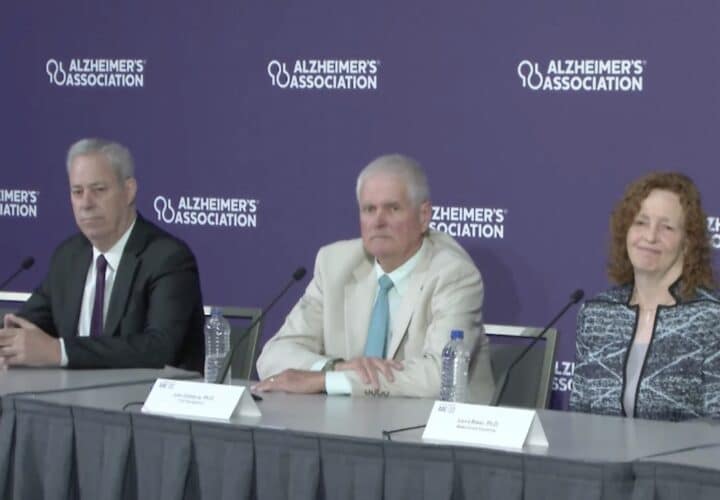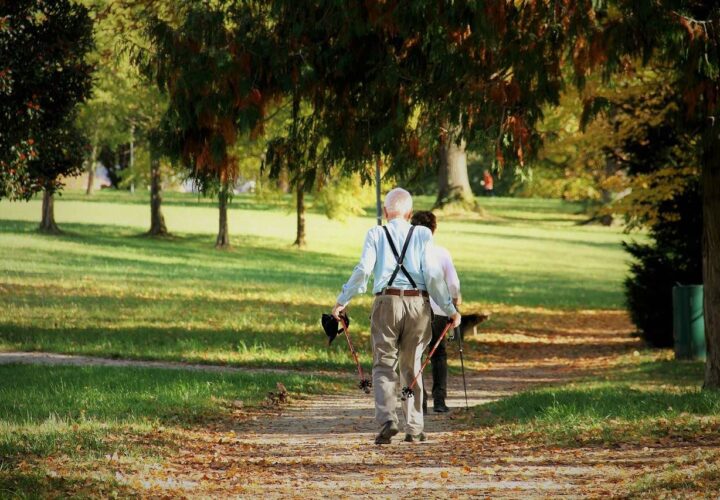At AAIC, reporter Phil Gutis learns low-intensity exercise could stop mild cognitive impairment in its tracks. But, researchers say, knowing this is only half the battle.
SAN DIEGO – The text message was short but pointed. I asked my husband Tim, a professional pet care provider and dog walker, if he could help me. “If I pay you $20 a day, would you take me for a walk?”
That’s Tim’s going rate for a dog walk. I figured if I offered him money, I’d be guaranteed to get a slot on his ever-busier calendar. And if I paid him, he’d force me out for my walk, just like he has to do sometimes with his more-reticent canine clients.
The text was prompted by a short walk from a presentation in a nearby hotel back to the San Diego conference center, where the Alzheimer’s Association International Conference was being held. The sun was hot, I was tired and my back hurt. I really questioned whether I was going to make it to the conference center. The saddest part? The walk wasn’t even a quarter of a mile.
***
Pre-pandemic, I had an awesome exercise routine. I belonged to an indoor rowing studio and went each and every day for an hour class. My weight was under control, my type two diabetes was in remission and my cardiologists were happy.
Post-pandemic things have not been so great. My rowing studio closed, and I just haven’t been able to establish an exercise routine. I’ve been fighting with my diabetes again — I even had to go on daily insulin shots for a while — and my blood pressure has been wonky at best.
I know I need to change. But even though I have a lovely Peloton bike right behind my desk, I haven’t been able to fit exercise into my day. I tell myself each and every morning that I will get on the Peloton, and then, by the time bedtime rolls around, I haven’t exercised, yet again.
***
Turns out my inability to work exercise into my schedule may just be more than laziness or procrastination.
At a news briefing at the AAIC conference this week, Dr. Laura Baker, a professor of gerontology and geriatric medicine at Wake Forest University, presented for the first time study results from the longest-ever Phase 3 study of exercise in older adults with mild cognitive impairment.
After 12 months of guided exercise — trainers from the YMCA worked with study participants — people with MCI enrolled in a moderate exertion aerobic exercise program and one significantly less strenuous stretching and balance regimen showed no cognitive decline.
I know I need to change. But even though I have a
lovely Peloton bike right behind my desk,
I haven’t been able to fit exercise into my day.
In comparison, a group of other older adults with MCI showed significant decline over 12 months. Brain scans did not show any shrinkage in the study participants.
“Our take home message is an increased of either low intensity or high intensity exercise for 120 to 150 minutes per week for 12 months may slow cognitive decline in sedentary older adults with MCI,” Baker said yesterday at a press briefing on the study.
These are very encouraging results, and definitely something that everyone living with a cognitive impairment should take to heart — along with anyone who hopes to avoid cognitive impairment as they age.
***
We all know that exercise is good. Just like we know that eating processed food is bad. And during the question-and-answer session following the news briefing, I asked Dr. Baker how society can get sedentary older individuals moving. Her response surprised me.
“What’s critical is this exercise — this regular exercise — must be supported in these adults with MCI. It must be supervised or there has to be some social component which was a key element in our study,” Baker said. “If we’re going to invest in a treatment for people with mild cognitive impairment, we’ve got to be willing to invest in supporting those individuals. What we’re seeing is, with that investment, there is protection.”
Without that support, exercise gains can be impossible to hold onto. Doug Maxwell of Wisconsin, who joined the study with his wife, told the Associated Press that the couple wouldn’t have done the exercise on their own.
“If we’re going to invest in a treatment for people
with mild cognitive impairment, we’ve got to be willing
to invest in supporting those individuals. What we’re seeing is,
with that investment, there is protection.”
This didn’t surprised Baker in the least: A person with MCI “left alone to exercise will never be able to do that, not ever, and it’s just part of the disease,” she explained. “The part of the brain that initiates and plans and inserts it in the day is not working. So they will always need an investment in social support.”
Maxwell said that he and his wife felt so good after the study ended, the couple bought electric bikes in hopes of engaging in slightly more energetic activity. Unfortunately, the Maxwells, like millions of Americans just like them, have found the effort is hard to keep up.
“A person with MCI left alone to exercise will never be
able to do that, not ever, and it’s just part of the disease.
The part of the brain that initiates and plans and inserts
it in the day is not working. So they will always
need an investment in social support.”
I’m hopeful that my newest strategy of paying my husband for a walk will help me overcome my brain’s unwillingness to schedule exercise into my day. I’m just worried that he’s going to take the whole thing too far and connect me to a leash to get me out of the house each day.
Phil Gutis is a former New York Times reporter and current Being Patient contributor who was diagnosed with early onset Alzheimer’s. This article is part of his Phil’s Journal series, chronicling his experience living with Alzheimer’s and his participation in the aducanumab clinical trial.




